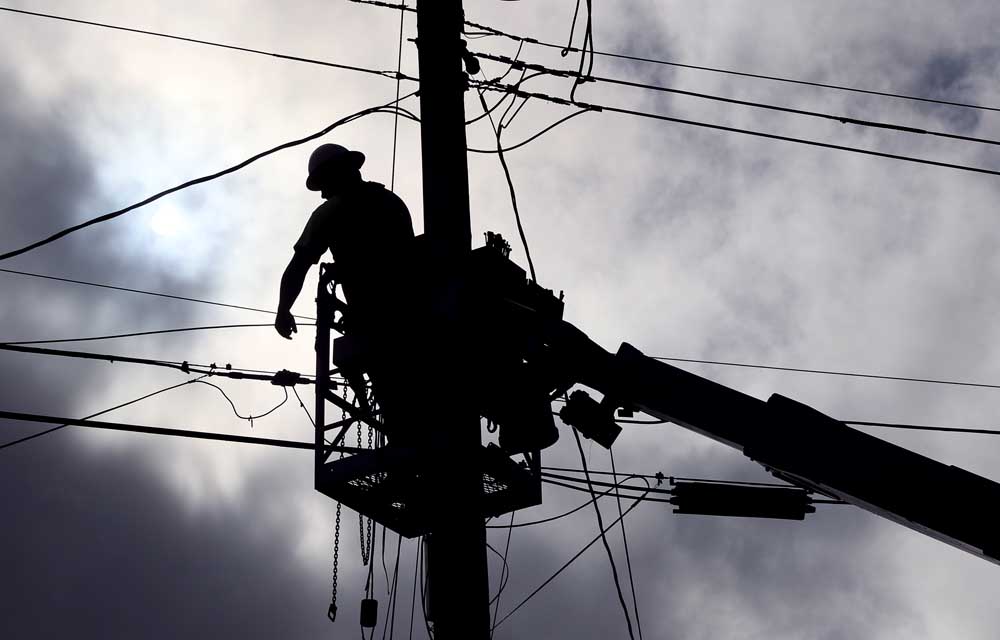‘We’re pretty popular’: Hunter heats up home broadband competition with Spectrum
Published 6:00 am Thursday, October 19, 2023

- Justin Devos, lead lineman with Hunter Communications, works on a line on Edgemont drive in Medford on Tuesday.
Armed with an arsenal of lightning-fast speeds and lifetime rates, a Southern Oregon-based challenger is duking it out with the local cable company for city dwellers’ high-speed internet dollars.
Trending
Hunter Communications of Central Point, long known for outfitting homes and schools with fiber-optic high-speed internet technology, is now giving Spectrum a run for its money in the home market.
CEO Michael Wynschenk said that the bulk of Hunter Communications’ new customers are residences switching over from cable. The company is advertising home internet plans starting at $59 per month for download speeds of 500 megabits per second. It comes with benefits the cable company either can’t match or isn’t matching.
For starters, Hunter Communications guarantees that it will never raise the price. Its technology, known to home users as “fiber to the home,” uses fiber-optic lines at all stages from the internet service provider to the home modem.
Trending
Hunter’s technology allows the company to offer the fastest wired internet speeds in Southern Oregon at 2.5 gigabits, or 2,500 megabits per second. That’s more than double Spectrum’s maximum advertised one-gigabit speeds.
“When you add it all up, we’re pretty popular,” Wynschenk said.
In addition to blazing-fast download speeds, fiber to the home technology also allows identically speedy uploads, which Wynschenk referred to as “symmetrical internet.” Cable and DSL upload speeds are a small fraction of download speeds.
“Most cable providers are using a copper network,” Wynschenk said. “A copper network has bandwidth limitations.”
No matter whether they’re signing on with Hunter or sticking with Spectrum, Southern Oregonians are reaping the benefits from the growing competition.
Steve Ryan of Medford, for instance, experienced above-and-beyond customer service with Spectrum that defied what he expected after calling the cable company.
It started when Ryan noticed that his basic internet rate was $10 higher than the $39 offered for new customers. After one no-haggle phone call with an obliging representative, Ryan not only got the introductory rate he wanted, the rep also knocked $15 off his mobile phone service.
“I already felt like I was paying a pretty fair rate,” Ryan said. “That’s what made it even more shocking — there was no pushback, and then she lowered the cell service.”
Cable companies may be losing their virtual monopoly on the fastest home internet speeds in the Rogue Valley, but they’re holding on to customers through new incentives such as mobile phone plans at affordable rates. Right now, for instance, Spectrum is discounting one line to $29 a month and a second line for free.
When asked about their growing competition from home fiber, a Charter Spectrum spokesperson emailed a statement calling Spectrum’s cable internet services “best in class.” It highlighted that the cable company has “more than 350 local employees in the Medford area.”
“Spectrum’s products and services are best in class, delivering the nation’s most reliable internet speeds,” the statement reads. “We provide local residents and small businesses superior connectivity at highly competitive prices, backed by a team of skilled local technicians and 100% U.S.-based customer service.”
Southern Oregonians are seeing a shifting landscape in how they wire up their homes thanks in large part to Hunter Communications’ aggressive expansion into the home space. Those changes were evident when Ryan took to Facebook to share his positive experience on the West Medford Residents group.
The post has garnered 96 reactions and 94 comments since it went up Sept. 15.
One woman in the comments described her own experience of above-and-beyond efforts from a Spectrum customer service rep to lower her internet rate.
“She said to always call and ask for promotions. Ask if your address qualifies for a promotion,” the comment said.
Others shared instructions how to sign up for the FCC’s Affordable Connectivity Program, while others largely shared satisfaction with Hunter Communications.
“Waiting on Hunter to get to my street,” one comment said.
“I spend $80 a month on internet with Wi-Fi. I can’t wait to ditch Spectrum. So glad they finally have competition moving in,” another posted.
Hunter Communications has nearly three decades of experience in commercial fiber networking wiring up schools and businesses since the early 1990s, but the company only started expanding to Rogue Valley residences three years ago.
Nationwide, fiber-based internet providers are gaining on cable internet, according to a study conducted for the industry trade group Fiber Broadband Association earlier this year by market research company RVA LLC.
Of the 4,000 people surveyed in the study, about a third said “they would be very likely to switch to FTTH (fiber to the home) if a new FTTH provider was available.”
The survey also showed that ultra high-speed internet is among the very top priorities in a home, behind only laundry rooms in single-family homes and in-unit washer-dryers in apartments and condominiums.
Fiber to the home internet was available to roughly 68 million American households as of September 2022, according to statistics provided by the association. Of those, approximately 28.3 million homes are connected.
Behind Hunter Communications’ expansion to the home market, Wynschenk said, were changes in home internet expectations sparked by the COVID-19 pandemic. It transformed high-speed home internet from a convenience to a necessity.
“What happened was, everybody stopped going to work, and work came to home,” Wynschenk said. “The requirements at home dramatically changed.”
Wynschenk became CEO in May 2020, shortly after the Central Point-based company was purchased by Washington, D.C., private equity firm Grain Management. Hunter Communications switched on its first Rogue Valley neighborhood in old East Medford less than three years ago. Crews began wiring the area near Hawthorne Park and Crater Lake Avenue around December 2020, and brought it online the following month, according to Rob Nance, Hunter Communications’ vice president of Fiber to the Home.
This summer, Hunter began running fiber to homes in west Medford.
The company declined to provide subscriber numbers, but Business Oregon’s interactive broadband mapping website shows that fiber internet from Hunter Communications is available in residential neighborhoods located in Medford, Ashland, Jacksonville, Central Point, Phoenix, Talent and Eagle Point.
“There’s still tremendous room to grow next year and the year beyond,” Nance said. He described plans “to expand deeper” into markets that include Ashland, Jacksonville and Grants Pass.
Outside the Rogue Valley the company plans to expand its presence in Klamath Falls, Eugene, Chiloquin and Yamhill County neighborhoods.
Nance said the company chooses areas with the most consumer interest when deciding which neighborhoods to build out next. Customers whose neighborhoods aren’t yet available can submit a request form at hunterfiber.com.
Hunter’s local workforce has grown more than two and a half times since 2020, according to numbers provided by Wynschenk. Hunter Communications had 85 workers when Grain Management bought the company in April 2020, and the company now has 215 employees.
Hunter Communications may be first to market in Southern Oregon, but at least one other telecommunications company is hoping to bring fiber internet service to Rogue Valley neighborhoods next year.
Lumen Technologies, owner of landline phone and DSL provider CenturyLink, said in an email that it intends to “build our fiber internet services and expand to additional households in Medford in 2024.”
The company will use the brand name Quantum Fiber. According to Lumen, Quantum Fiber offers “speeds starting at 200 mbps up to 8 gig, with pricing options designed for both basic internet surfers and power users.”
Quantum Fiber’s website advertises a 500 mbps plan for $50 a month and $75 for 940 mbps.
Wynschenk said that the speeds Hunter can offer has significant room for growth. Increasing speeds only requires upgrading home modems and new ISP technologies.
“You don’t change the fiber, you just change the box,” Wynschenk said. “Then we go in our network and we change out a card.”








